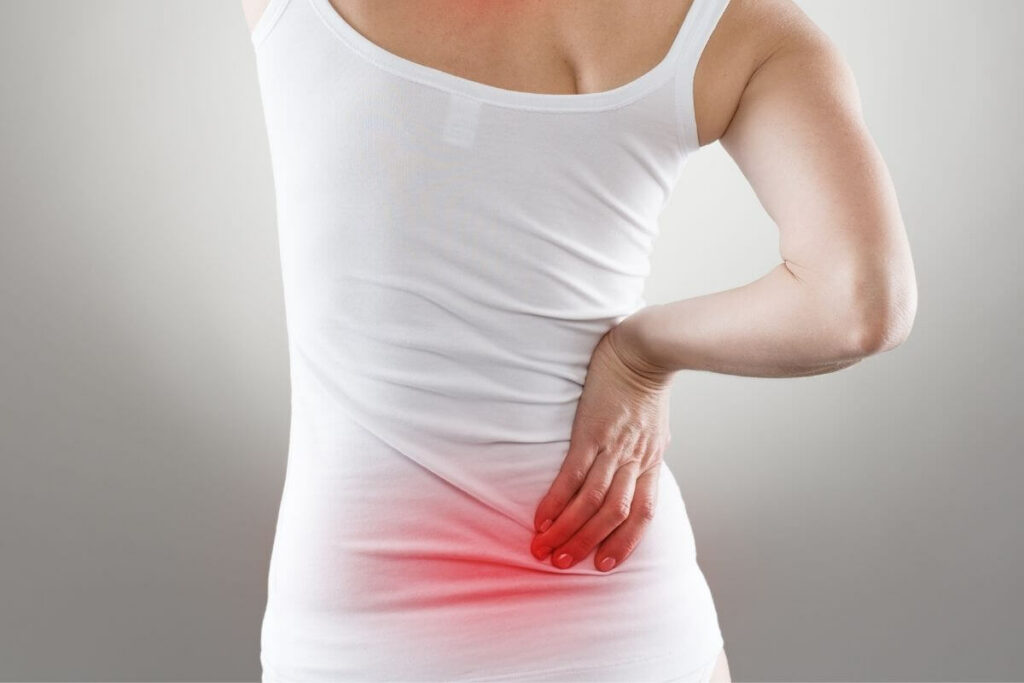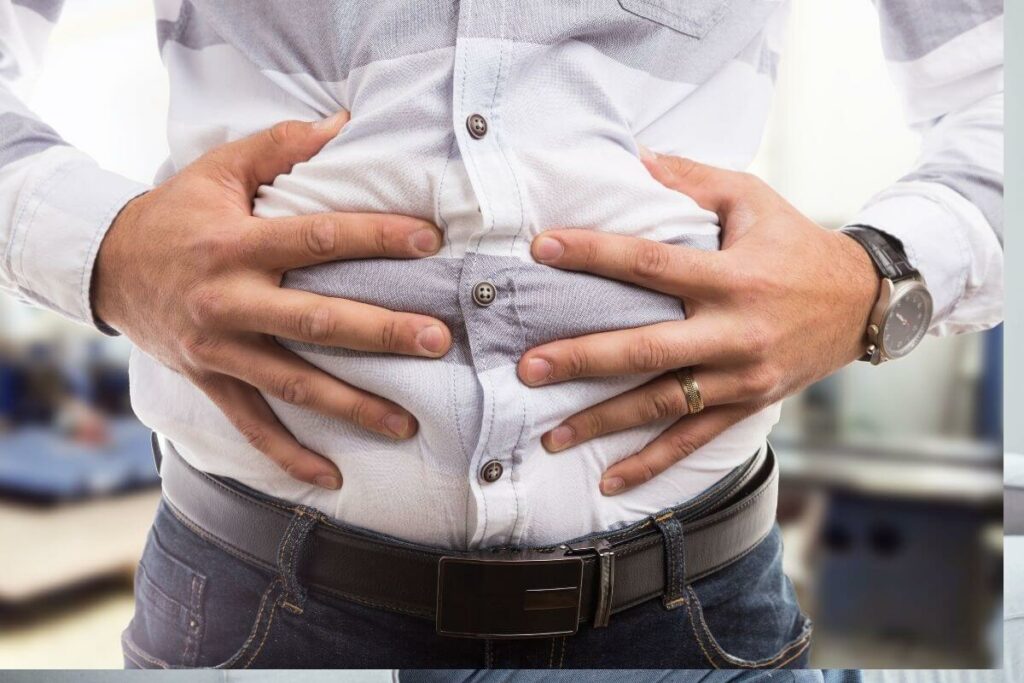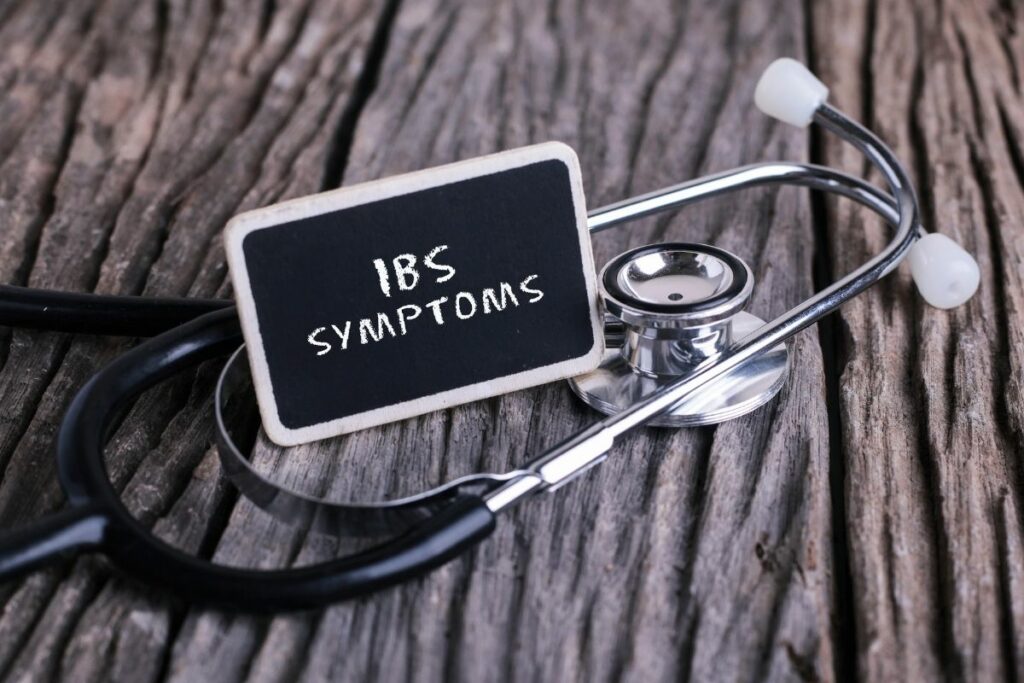
IBS and Back Pain
Irritable bowel syndrome (IBS) is one of the most common digestive problems, impacting the lives of near 20% of the UK population.
It is classed as a functional disorder. This means that upon investigation there is no sign of damage or inflammation, however, the function is still affected.
This change in function leads to a wide range of symptoms and problems. Many of the main symptoms of IBS are common for each person looking for help.
These are the symptoms such as:
- Bloating
- Cramping
- Stomach pain
- Changes in bowel patterns (either constipation, diarrhoea, or alternating between the 2) [Source: BMJP]
There are also other symptoms that may be less common but lead also lead to pain. This pain can appear in various areas such as:
- IBS pain in the lower back
- IBS pain between the shoulder blades
- IBS back pain on the right-hand side
- It can be common for this pain to rise and fall along with the other symptoms of IBS. [Source: NHS]

What does IBS back pain feel like?
In IBS, often the common symptoms such as bloating, or pain can be felt in a direct or localised way. This means with these types of symptoms of pain, it can be clear that they’re originating from the digestive system. For example, if there is a pain in the lower right-hand side this may indicate pain coming from the appendix [Source: NHS]
IBS back pain can be often due to what is known as referred pain. How the pain in one part of the body can lead to pain in another. For example, this is commonly seen in those with heart issues feeling pain in their jaw.
In digestive issues such as IBS, this may be due to excess gas being produced and pushing on organs or nerves, resulting in symptoms of pain and discomfort.
It has also been found in research that IBS patients with panic disorders have increased rates of back pain. This can be due to the role stress and stress hormones play in increasing pain perception [Source: Pubmed, Pubmed]
Instead of this type of IBS pain always been described as pain, some studies refer to this as back ache. This type of description may better describe how IBS back pain feels [Source: Pubmed]
Can IBS cause lower back pain?
Yes, IBS can cause lower back pain. The pain is often due to gas pressure, colon spasms, or swollen bowels, which are common symptoms of IBS. These physical factors can lead to discomfort in the abdomen and radiate to the lower back, causing significant pain and discomfort.
This may be particularly true for those experiencing high amounts of bloating as well as those experiencing constipation. This excess pressure from within the digestive tract can be a key factor in back pain.
Also Read: Does Green Tea Help With Bloating?
Additionally, alterations in the functioning of the diaphragm can impact digestive functions and contribute to IBS symptoms. The diaphragm is a muscle located below the lungs and plays a key role in breathing and respiration. It also works to support posture and body position. Diaphragmatic dysfunction has been shown to be a cause of pain in the lower back.
It has been found that in those with IBS there can be a degree of dysfunction in the diaphragm. This can potentially be a factor that contributes to digestive symptoms such as bloating as well as lower back pain [Source: Pubmed]
IBS back pain between shoulder blades
The pain between the shoulder blades may be due to IBS symptoms. It’s also possible for this to be another type of pain, potentially stemming from the gallbladder. The gallbladder is the storage area for bile, a key digestive enzyme whose job it is to break down the fats we consume. This would be another example of referred pain.
Even though the pain between the shoulder blades is a reasonable distance from the gallbladder, this pain may be originating from the gallbladder.
If gallstones are formed in the gallbladder, this impacts bile flow and may even cause a blockage. This can result in symptoms such as
- Pain between the shoulder blades
- Pain in the upper right portion of the stomach
- Pain in the middle of the stomach or below the breastbone
- Since the release of bile is stimulated by the ingestion of fats, these symptoms of pain may worsen following a meal that contains fats. Particularly in the presence of gallstones. [Source: Mayo Clinic]
Can IBS cause back and leg pain?
Some research has indicated that those with IBS, particularly those with the constipation subtype, are more sensitive to pain. This can mean that even a small amount of nerve activation can feel a great deal more sensitive and painful in this group of individuals [Source: Pubmed].
It is also possible that SIBO, bacterial overgrowth in the small bowel, can lead to issues with legs such as restless leg syndrome. SIBO is seen to be the underlying issue in up to 80% of those with IBS. This can lead to discomfort and pain in the legs [Source: Pubmed]
Those with IBS also have a higher rate of also having fibromyalgia. In this syndrome, pain is experienced throughout the body, including the back and the legs. A study from 2004 found that 100% of the participants with fibromyalgia also tested positive for SIBO [Source: BMJ].
Since SIBO is found in a large percentage of IBS causes. Some research indicated that SIBO is present in up to 78% of IBS cases [Source: Pubmed].

Lower back pain associated with bowel movement
One of the key symptoms by which IBS is diagnosed is the symptoms of pain. Within the diagnostic criteria for IBS, this pain would need to improve following a bowel movement.
Commonly following a bowel movement, other symptoms and problems such as back pain can improve as well as the digestive symptoms associated with IBS [Source: Pubmed].
Symptoms of IBS in females

Symptoms of IBS may vary between women and men. The prevalence of IBS between the 2 sexes does vary, with 1 study indicating IBS affects 14% of women vs 8.9% of men. This may lead some to believe that this difference is influenced by the fact that women are more likely to seek help for this, however, this may not be the full story.
There are gender differences in symptoms also. Women appear to report increased levels of bloating and constipation, while men report increased diarrhoea symptoms. This may be related to the role sex hormones play in the digestive tract.
Women with IBS also tend to report lower QoL (quality of life), more fatigue, depressed mood, less positive well-being and self-control, and higher levels of anxiety than men with IBS [Source: Pubmed]
How Do I Get Rid of IBS Back Pain?
While there can be some strategies to manage the pain, a key part of the approach can be to address the IBS. Particularly if this is what is contributing to the pain in the first place.
One approach is to use heat in the form of heat pads or a hot water bottle to improve lower back pain. Interestingly, an approach using cold therapies which can include ice packs has also been shown to improve back pain [Source: Pubmed]
In another study, movement and exercise were shown to improve symptoms of lower back pain [Source: Pubmed].
Meditation and mindfulness practices have also been shown to improve lower back pain as well as IBS symptoms. The benefit of this can be due to factors such as balancing the gut-brain connection and reducing pain perception [Source: Pubmed, Pubmed]
Back Pain & Sleep
A frustrating aspect of back pain is that it can reduce sleep quality which has a knock-on effect [Source: Pubmed].
It has been shown that poor sleep increase pain and IBS symptoms as well as reduced mood. This can be an aspect that creates a cycle where pain leads to poor sleep which then leads to increased pain [Source: Pubmed].
A recent study found that poor sleep resulted in an increase in symptoms the following day. These symptoms included pain, anxiety and fatigue [Source: Pubmed].
Another cycle that can be created is the role stress plays in poor sleep. Since pain is increased after poor sleep this can also increase stress levels which then has the potential to reduce sleep quality. This is another reason why stress management practices such as mindfulness can be helpful to manage stress and pain as well as improve sleep quality and gut health [Source: Pubmed]
Back pain can be the result of IBS or imbalances in the gut. It can also be the result of other factors such as poor sleeping position or issues with a mattress [Source: Sleep Foundation].
Treatment For IBS Back Pain
The long-term strategy for the treatment of back pain that appears to be stemming from IBS is to address the IBS itself. While the exact cause of IBS is not the same for each patient, there are common factors that can contribute to IBS symptoms.
These include:
- Imbalances in gut bacteria
- Low-grade inflammation
- SIBO (small intestinal bacterial overgrowth)
- Food intolerances
- Intestinal permeability [Source: MDPI]
The approach can vary depending on the underlying factors. However, common approaches include:
- Dietary changes [Source: Pubmed]
- Probiotic [Source: Pubmed]
- Prebiotics [Source: Pubmed]
- Medicinal herbs [Source: Pubmed]
- Stress management [Source: Pubmed]
These are selected based on factors such as symptoms, triggers, how symptoms started (e.g. following food poisoning) and test results.
A Registered Nutritional Therapist can guide you through this process.
Frequently Asked Questions:
Is back pain common with IBS?
Pain is a common feature of IBS. This can appear in the stomach, the lower abdomen as well as in the back and can be related to several factors.
These include levels of gas being produced in the gut, bowel movements (eg constipation) as well as the functioning of the diaphragm and sleep quality.
How long does IBS back pain last?
IBS back pain can appear at different times of the day. For some, this may be worse towards the evening time and may impact sleep or it can improve following a bowel movement. In other situations, is can appear and disappear without an apparent reason.
Even if there are specific triggers for this pain, addressing the underlying issues in the gut is an important way to resolve back pain.
Can natural remedies help?
Natural remedies and approaches can be very helpful at reducing pack pain and addressing underlying issues in the gut that are contributing to symptoms. These imbalances can contribute to both the symptoms of IBS and back pain.
Natural approaches have been well-researched in medical literature for their ability to support these symptoms. Common approaches include supplements (such as probiotics and prebiotics), medicinal herbs as well as mindfulness practices and physical therapies.






